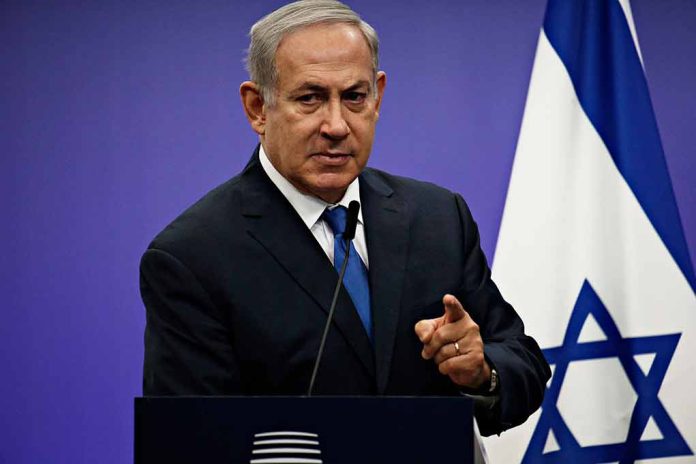
Israel just blocked Saudi Arabia’s first diplomatic mission to the West Bank in decades, and now the Saudi Kingdom has declared this move proof of Israeli “extremism and rejection of peace” as Arab nations plan a separate international conference to pursue Palestinian statehood without Israeli participation.
Key Takeaways
- Saudi Arabia has publicly condemned Israel for blocking a planned visit by Arab foreign ministers to the West Bank, calling it evidence of “extremism and rejection of peace”
- Saudi Foreign Minister Prince Faisal bin Farhan Al Saud’s visit would have been the first by a top Saudi official to the West Bank in recent memory
- Israel justified blocking the visit, claiming the Palestinian Authority planned to host a “provocative meeting” promoting Palestinian statehood
- In response, France and Saudi Arabia are organizing an international conference in New York from June 17-20 to discuss Palestinian statehood without Israeli involvement
- The diplomatic tensions come as Israel faces increasing international pressure supporting a two-state solution
Saudi Arabia’s Harsh Rebuke of Israel’s Diplomatic Blockade
The Kingdom of Saudi Arabia has issued a stinging rebuke after Israel barred a delegation of Arab foreign ministers from visiting the West Bank. This unprecedented diplomatic roadblock has dramatically escalated tensions between Israel and Arab nations attempting to support Palestinian interests. Speaking at a news conference in Amman, Jordan, Saudi Foreign Minister Prince Faisal bin Farhan Al Saud condemned Israel’s decision to deny the planned visit, which was intended to meet with Palestinian President Mahmoud Abbas in Ramallah amid the ongoing Gaza conflict.
“Israel’s refusal of the committee’s visit to the West Bank embodies and confirms its extremism and refusal of any serious attempts for [a] peaceful pathway … It strengthens our will to double our diplomatic efforts within the international community to face this arrogance,” said Prince Faisal bin Farhan Al Saud, Saudi Arabia’s Foreign Minister.
The planned diplomatic mission held significant historical importance as Prince Faisal’s visit would have marked the first time in recent memory that a top Saudi official formally visited the occupied West Bank. Israel, which controls all West Bank airspace and border crossings, effectively shut down this diplomatic initiative by denying permission for the Arab ministers to enter the territory. This action has further isolated Israel from regional peace efforts and reinforced perceptions among Arab states that the Netanyahu government is not interested in genuine peace negotiations.
Israel’s Justification and Arab Response
Israeli officials defended their decision to block the Arab ministers’ visit, arguing that the Palestinian Authority was planning to use the meeting to advance Palestinian statehood goals. In a statement that revealed Israel’s concerns about the diplomatic mission, an unnamed Israeli official claimed the visit was part of a provocative agenda by the Palestinian Authority, which “to this day refuses to condemn the October 7 massacre.”
“The Palestinian Authority – which to this day refuses to condemn the October 7 massacre – intended to host in Ramallah a provocative meeting of foreign ministers from Arab countries to discuss the promotion According to The Palestinian Authority
Jordan’s Foreign Minister Ayman Safadi joined Saudi Arabia in criticizing Israel’s actions, stating that blocking the diplomatic mission was “killing any chance of a just and comprehensive” Arab-Israeli settlement. The cancellation of the visit has only hardened Arab resolve to pursue alternative diplomatic channels outside of Israeli control. This diplomatic confrontation represents a significant setback for any potential normalization efforts between Saudi Arabia and Israel, which President Trump had worked to facilitate during his administration.
International Conference Planned Without Israel
In a direct response to Israel’s diplomatic obstruction, Saudi Arabia and France have announced plans to co-chair an international conference in New York from June 17 to 20. This conference will focus on Palestinian statehood, security arrangements following a potential Gaza ceasefire, and reconstruction plans for Gaza. By organizing this conference without Israeli participation, Saudi Arabia and other Arab nations are signaling their intent to pursue Palestinian diplomatic objectives through alternative international forums.
Egyptian Foreign Minister Badr Abdelatty confirmed that the conference will address critical post-conflict issues including security arrangements and reconstruction plans designed to prevent Palestinian displacement. The timing of this conference appears strategic, coming immediately after Israel’s rejection of the Arab ministers’ visit to the West Bank, and reflects growing international impatience with Israel’s positions on Palestinian statehood and the ongoing Gaza conflict.
President Trump’s administration has consistently supported Israel’s security concerns while also recognizing the need for a sustainable peace. However, this latest diplomatic confrontation highlights the challenges facing American efforts to broker regional stability. As Israel faces mounting pressure from the United Nations and European countries that support a two-state solution, the rejection of Arab diplomatic initiatives risks further isolating Israel internationally and complicating American strategic interests in the region.



